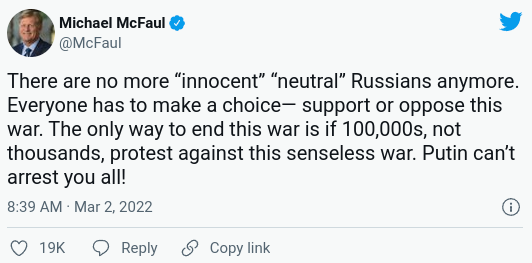Russian Cancel Culture
Published:
Somewhere near the bottom of the world’s concerns last week was whether the 2022 International Congress of Mathematicians (ICM), scheduled to take place in St. Petersburg this Summer, would continue as planned. There had been a proposed boycott since the location was announced in 2018, but it was set to fail until last week. But then Russia invaded Ukraine and the boycotters got their wish. The 2022 ICM will take place online, effectively declaring Russia as unsuitable to host.
Moving the ICM from Russia was a good decision for the following reasons.
-
It is physically difficult to enter Russia from the West right now, it may get worse, and we have no idea when it will get better. Since the European Union and the US closed their air space to Russian airlines, the only way I see to get to St. Petersburg by air from New York is staying overnight in Turkey.
-
Russia may become more hostile to political dissent after the invasion. The Russian government is already famously intolerant of dissent, but even countries with better track records do bad things during crises. Harsh sanctions and a gruelling war may be such a crisis for the Putin government. How many signatories on the boycott are concerned about retribution?
However, I am worried about overstating the moral case here. Putin is doing something bad, and we should discourage him. But the ICM has nothing to do with that. The ICM has no power over anything in the countries it visits. Having the meeting in Russia does not contribute to the bad things that Russia does, and not having the meeting does not contribute to anything good. In this sense the meeting is very low-stakes, which is why the reasons above are more than enough to move it.
But the boycotters think there was a genuine moral case for moving the meeting. They wrote the following before Russia invaded Ukraine:
Under these circumstances, the decision of [the International Mathematical Union] to hold the Congress in Russia demonstrates either moral indifference or ignorance about the actions of Putin’s regime.
If we apply this argument to everything Russia has any involvement in, no matter how insignificant (and the ICM is insignificant!), then we should boycott essentially everything and everyone from Russia. Lots of very politically ineffective things have been done recently inspired by this argument.
Here is the Glasgow Film Festival announcing the removal of two Russian films seemingly because they are Russian:
A statement from Glasgow Film Festival. pic.twitter.com/HjyYXhYPCJ
— Glasgow Film Festival (@glasgowfilmfest) February 28, 2022
Here is, for some reason, EA Sports announcing that the Russian national teams would be removed from FIFA 22:
A statement from EA SPORTS FIFA: pic.twitter.com/v3pZvpblgS
— EA SPORTS FIFA (@EASPORTSFIFA) March 2, 2022
These are both silly. They will not pressure the Putin regime nor help anyone in Ukraine. However, they will also not seriously harm anyone innocent. Some reactions to the invasion are not so kind.
Here is the former US ambassador to Russia, Michael McFaul, claiming that there are no “innocent” Russians anymore:

Here is Russian social scientist, Ilya Matveev, complaining about retributions in academia:
I'm so disgusted with rejection letters, invitation cancellations, grant withdrawals etc. against Russian scholars from Western academics who fight Putinism by attacking those who have suffered from it for decades.
— Ilya Matveev (@IlyaMatveev_) February 28, 2022
The Putin regime is doing something bad and we should discourage its behavior. But everything we try—from something silly like moving the ICM, to something serious like imposing new sanctions—might escalate the current conflict. And as Matthew Yglesias recently wrote, “We can’t just escalate and escalate. There has to be some goal in mind that counts as a win and lets people back down.” Shunning everything related to the Russian government is not a sufficiently targeted goal.
Fortunately we don’t seem to be moving towards Russian internment camps or anything like that in the West. If all we do is remove Russian national teams from some sports games and disinvite a few filmmakers, then I am not so worried. But I hope that our newfound moral clarity about Russia does not go too far. We have run into trouble with this in the past.